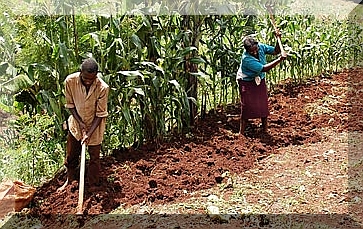Smallholder Farming in Africa: Climate Casualty or Pioneer?

 |
| Farmers tend their farm Photo courtesy |
Agriculture is
More than 70% of Africans gain their livelihood through farming, and almost all are smallholder farmers who rely on erratic rains and risky agricultural systems. It is predicted that climate change will put up to 250 million people in the semi-arid Sahel at increased risk of droughts. Flooding in southern Africa is expected to increase floods, bringing to mind those of 2000 which wiped out one-third of
So, while Africa contributes less than 3% of global greenhouse gas emissions, compared to 40% from the G-8 countries, it stands to bear the brunt of the economic, human and social consequences of climate change.
In some countries, crop yield may be cut in half. This would be devastating, given that even now yield is just one-quarter the global average. Such low yield is the result of low-input, low-output agriculture which mines the soil of nutrients, and fuels both hunger and deforestation.
International and African policymakers and scientists must therefore move urgently to help
Mitigation is also a complex challenge, but solutions are at hand in the fields of farmers. Today, most smallholders farm the land continuously, without the benefit of fertilizers, organic or manufactured. Thus, three-quarters of
Global and African policymakers should provide incentives for farmers to avoid deforestation through intensified production on existing land, implemented through environmentally sound land use practices that also sequester carbon and protect crop diversity.
Intensification and conservation is a challenge-it need not be a contradiction.
It is a challenge we must meet if African carbon is to count the global carbon market.We must insist on a global carbon market which fully accounts for the environmental benefits of sound agricultural practices of smallholder farmers. REDD, a critical financial mechanism for Reducing Emissions from Deforestation and Forest Degradation, is under debate and appears on track to being passed. It should include payments for ecosystem services provided by smallholder farmers.
We cannot let the global inequality which distorts the world's agricultural markets replicate itself in the global carbon market. To do so would be counter-productive and inexcusable.
African farmers are embarking on a sustainable, uniquely African green revolution. Theirs is perhaps the greatest race against time in human history. They need access to the technologies that will enable them to grow more food and do so sustainably. Global and national policies should offer incentives and compensation for environmentally friendly intensification of farming and avoided deforestation. It is in Africa's own interests to develop its agriculture as a diverse, high-productivity, low-carbon system that benefits our farmers, our economies and our environment. The result will be a food secure and prosperous Africa, leading in the creation of a more stable global climate and food secure world.
By Dr Akin Adesina,
Vice President of Policy and Partnerships
Alliance for a Green Revolution in Africa (
